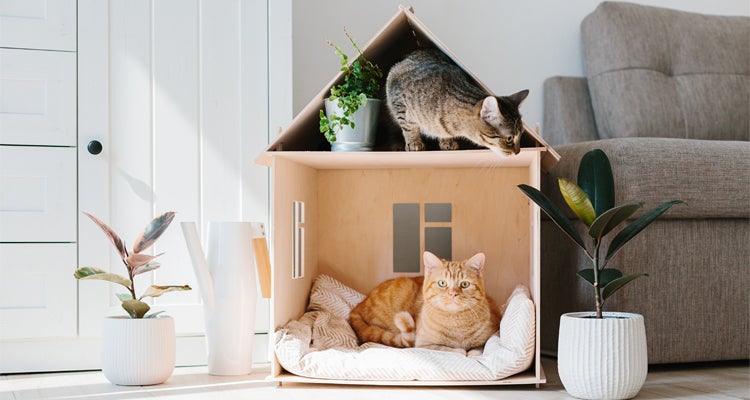
Why Your Kitten's First Vet Visit Is So Important
It's a happy moment to bring a kitten home, but you also have to make sure they stay healthy for the rest of their lives. The foundation for a healthy future is laid by your kitten's first visit to the vet. This blog provides comprehensive instructions, professional advice, and necessary checklists to help you prepare for your kitten's first visit to the veterinarian.
Before the Appointment: Preparing for Your Kitten's First Veterinary Visit
First Vet Visit Checklist for Kittens and New Pet Parents
Preparation is key to making your kitten’s first vet trip smooth and stress-free.
Use a secure, ventilated carrier to keep your kitten safe during transport.
A blanket or toy with your kitten’s scent for comfort
Carry adoption or vaccination paperwork if you have it.
Any prior medical or adoption records
Avoid feeding your kitten right before the visit.
Help ease their nerves by placing a soft blanket or toy inside the carrier.
A fresh stool sample (if available)
Tip: Make sure you have your veterinarian's contact details and medical records are readily available.
Preparing Kittens for Vet Visits: Reducing Stress Before You Leave
Getting used to the carrier
To make the journey much more pleasant for your little one, we'd recommend a cat carrier with a secure lock. It's all too easy to escape from an ordinary cardboard box, or from your arms. She'll feel much more comfortable if you turn the carrier into a home away from home by putting something with her smell on it inside. Place a toy or a blanket inside – something that smells of your kitten as it will reassure her and make her feel safe. At first, she might be a bit wary of her cat carrier. Get her used to it by putting it out a few days before you need it. Make sure it’s locked to keep her secure while travelling.
The first appointment
Keep her inside the carrier until you go into the examination room. Stroke and talk to your kitten to help her feel secure, during the examination. If she’s comfortable during the first visit, she’s more likely to be relaxed on future visits as well. You vet will also advise you on how to keep your kitten mentally and physically, healthy and happy.
What to Expect at Kitten's First Vet Visit: Step-by-Step Breakdown
Step 1: Kitten Health Check at First Vet Visit
Once in the exam room, the vet will perform a thorough physical exam:
- Weight and growth check
- Temperature
- Eyes, ears, nose, and mouth exam
- Skin, coat, and hydration check
- Listening to heart and lungs
Advice: Talk softly and pet your kitten to help them stay calm. It can improve a kitten's first visit to the veterinarian if you know how to calm them down.
Step 2: Discussing Kitten Health History and Behavior
Your vet will ask about:
- Eating habits and food brand
- Sleeping patterns
- Litter box training
- Energy and play levels
- Past illness or symptoms observed at home
This is the time to bring up signs of stress in kittens at the vet or unusual behaviors you've noticed.
Step 3: Vaccinations for Kittens at First Vet Visit
The initial round of your Kitten vaccinations will probably receive may consist of:
- FVRCP: Protects against rhinotracheitis, calicivirus, and panleukopenia
- Rabies: As per local regulations
Tip: Ask your veterinarian when the next vaccinations are scheduled and for the complete kitten vaccination routine checkup timeline.
Step 4: Optional but Essential – Microchipping and Flea Control
Your vet might recommend preventive care like:
- Microchipping
- Flea and tick prevention
- Dental hygiene products
These are crucial components of long-term kitten veterinary care, but they are not required at the initial appointment.
Step 5: Important Questions to Ask at Your Kitten's First Vet Visit
Come prepared with questions like:
- What food is best for my kitten's age?
- When should I consider neutering/spaying?
- How often should I groom or bathe my kitten?
- Are there signs of common illnesses I should watch for?
- What's the cost of a kitten's first visit to the veterinarian?
Pro Tip: Asking the right questions helps you make informed decisions and supports your kitten's wellbeing.
Aftercare for Kittens Post Vet Visit: What Comes Next?
Monitor for Reactions or Behavior Changes
Keep an eye out for:
Mild lethargy (normal post-vaccination)
Swelling at the injection site
Vomiting, diarrhea, or loss of appetite
Advice: If symptoms persist beyond 24 hours, contact your vet.
Keep Track of the Next Appointments
A vaccine calendar will be provided by your veterinarian. Remind yourself to always attend follow-up appointments, particularly for the upcoming booster shots and flea/deworming treatments.
Emergency Signs to Watch Out For
In some cases, immediate treatment by the vet is necessary. The sooner your kitten gets medical help, the sooner she can recover. Keep in mind some symptoms that need urgent attention:
- Blood in urine or poo
- Diarrhoea – pooing more than twice an hour
- Straining in the litter box with no results
- Vomiting more than three times an hour
- Lethargy
- Weight loss in a short time
- Laboured breathing
- Flinches or cries if touched
- Something hanging out of her mouth (eg. string or tinsel)
- Change in “normal” behaviour
Conclusion:
More than just a health milestone, your kitten's first visit to the veterinarian is an opportunity to start life off right. You can make sure your kitten receives the veterinary care they require to develop into a healthy, strong adult by planning ahead, being aware of what to expect, and asking the right questions.












